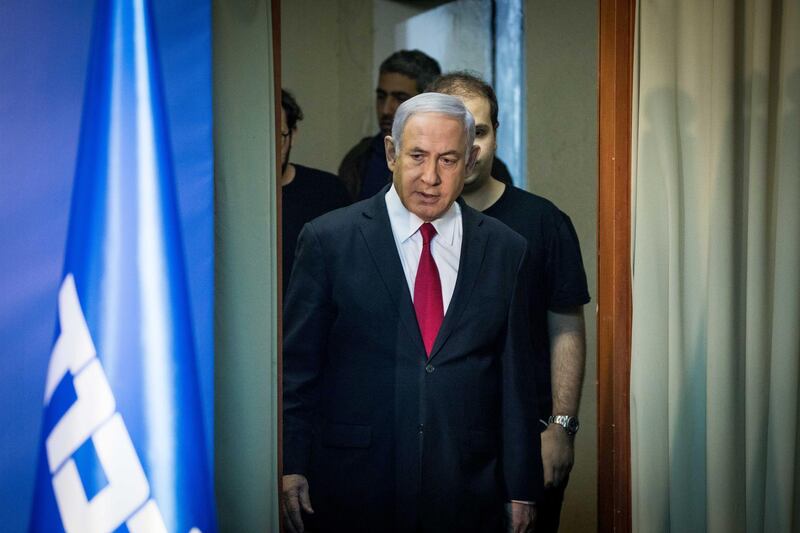Michael Ben-Ari has been denied entry to the United States for his links to terrorism. Now he's a leader in an extreme right and racist fringe-party, Jewish Power (Otzma Yehudit), which Israeli Prime Minister Benjamin Netanyahu is proudly aligning with in this April's election.
Mr Netanyahu cancelled a meeting with Russian President Vladimir Putin last week to instead push Jewish Power and two other small far-right parties to merge, as each party alone was not expected to pass the electoral threshold for entering the parliament.
Mr Netanyahu promised Jewish Power two ministerial positions in exchange for joining his coalition after elections.
The move rattled and enraged Jewish diaspora leaders and Mr Netanyahu's opponents, who quickly condemned the prime minister's sanctioning of a group dubbed the Israeli KKK. But what remains unclear until April is how much Mr Netanyahu's move will actually attract or alienate Israeli voters in an election seen as a referendum on "King Bibi". He is simultaneously battling several corruption cases and fighting for his political life and legacy after Israel's attorney general announced his intention to indict him in those cases on Thursday evening.
"I think Israeli people think that the prime minister has gone not just in opinions but also reactions to the far right," Tal Schneider, a veteran Israeli journalist, told The National. "People used to think that he's more moderate."
The stakes for Netanyahu’s gamble on surviving via the most right-wing coalition yet are high. If Mr Netanyahu wins the election, he will surpass Israel’s founding father David Ben-Gurion as Israel’s longest serving prime minister. For the last several years, though, said Ms Schneider, “he has stopped talking to the centre and to the left. He no longer conducts himself as the prime minister of all”.
She speculated that his move was both calculated – and will be persuasive.
“If he acts like this I guess he found some polling that suggests that those opinions could be more embraced by the people,” said Ms Schneider. “You cannot undercut or underestimate his persuasive power… He will make his opinion and people will come to it.”
Other analysts disagreed. Israeli writer Yossi Klein Halevi described Mr Netanyahu's move as a sign of his "new panic mode". Mr Halevi described how "the centre has emerged as a credible threat" challenging Mr Netanyahu's inevitability this election, with several centrist leaders and parties uniting under one ticket to harness this key voting bloc.
“The likely result will be a boomerang for Netanyahu,” Mr Halevi said. “Yes he will salvage some votes that he probably lost to the right wing bloc, but he has profoundly alienated a fair number of Israeli voters who see this move as beyond the pale and also as a sign that Netanyahu is not a trustworthy leader anymore.”
Mr Netanyahu became prime minister for the second time back in 2009 when Mr Ben-Ari was first elected to Israel’s Knesset, where the latter was publicly shunned. Mr Ben-Ari and the other leaders of Jewish Power are outspoken followers of the late Rabbi Meir Kahane, a Brooklyn-born American Jew who emigrated to Israel in 1971 and who’s organisation, Kach, has been designated a terrorist group by the US and banned as a political party in Israel for racism and incitement to terrorism.
Like Kahanism, as Kahane’s fiery brand of violently anti-Arab and religious nationalist ideology is known, the Jewish Power party calls for annexing the occupied Palestinian Territories, expelling “enemies,” of Israel, in reference to Palestinians, taking over the Haram Al Sharif, and preventing mixed Arab and Jewish marriages and relationships.
"Those [Palestinian Arabs] who are loyal to the state, ahlan wa sahlan," Itamar Ben Gvir, another Kahana disciple and now Jewish Power party leader recently told The Times of Israel. "But those who are not must be expelled."
While Kahanism has always been on Israel’s political fringe, its violence has also been the driver of pivotal events. Baruch Goldstein, who killed 29 worshippers and injured hundreds more in the Ibrahimi Mosque massacre in Hebron, was active in Kahane’s Kach party. Yigal Amir, the assassin of Prime Minister Yitzhak Rabin who helped to push through the Oslo Peace Accords, revered Kahane. Kahane himself was assassinated in 1990 by an Egyptian gunman.
Another Kahane disciple and now Jewish Power leader is Benzion Gopstein, who heads Lehava, a violently anti-Arab gang of youth who “save” Jewish women from assimilation. They disrupt weddings and relationships between Jews and Arabs, and harass Palestinians in the streets of Jerusalem.
Recent investigations by New York-based The Nation, Israel's Yediot Ahronot, and an Israeli watchdog group, The Democratic Block, have traced how Israeli and US funders and taxpayers have supported Gopstein, Mr Ben-Ari, and other Jewish Power associates' work through networks of charities and NGOs, allegedly at times in violation of US anti-terrorism funding laws.
"Since the Kach Movement was outlawed, Kahane's ideological successors have developed new systems to operate and get funding," Ran Cohen of the Democratic Bloc organisation told Yediot Ahronot. “… Money transferred from the state to such organisations is only one example of the way the government whitewashes Kahanism."
The question now remains whether Mr Netanyahu’s calculation will pay off for him – and to what consequence for Israeli politics and society.
Mr Halevi said that he himself up to now “had given Netanyahu a pass. I wasn’t planning on voting for him, but I have voted for him in the past and I was one of those Israelis who felt a sense of gratitude to Mr Netanyahu for keeping this country safe... But after this move he has turned me into a vocal and public opponent.”
While Jewish Power leaders have been on a media blitz trying to revamp their image, Mr Halevi said that he did not think Israelis are “fooled” by a “sham” of a cover up. Ms Schneider, however, said she did not think some in the Israeli media were being critical enough.
For Moran Pinto, 35, an ultra-Orthodox Jewish Israeli in Jerusalem, however, some "extreme with boundaries," is a good thing in order to keep the government stably to the right, she told The National, a view that would worry Arabs in Israel.
Ms Pinto, as a member of Israel’s insular Haredi communities, which are 12 per cent of the population, is just one kind of voter. But it’s the political mainstreaming of these sentiments that worries Mr Halevi.
“Lehava is a fringe of a fringe, but now that it’s been sanitised by a mainstream party I’m worried that its influence can spread,” he said.
Mr Netanyahu’s alliance with Jewish Power even prompted indirect criticism in a subtweet from the American Israel Political Action Committee, the largest pro-Israel lobby in American that has been very supportive of Mr Netanyahu’s government.
Ms Schneider, however, described Aipac’s criticism as “very moderate” and “hiding behind the bush”. The tweet came on a Friday night Israel time, when much of Israel is offline for the Jewish Shabbat, she noted. And, just a day later, Aipac announced that Mr Netanyahu would be headlining their annual policy conference per usual.
“These are the friends of the Prime Minister,” said Ms Schneider.






